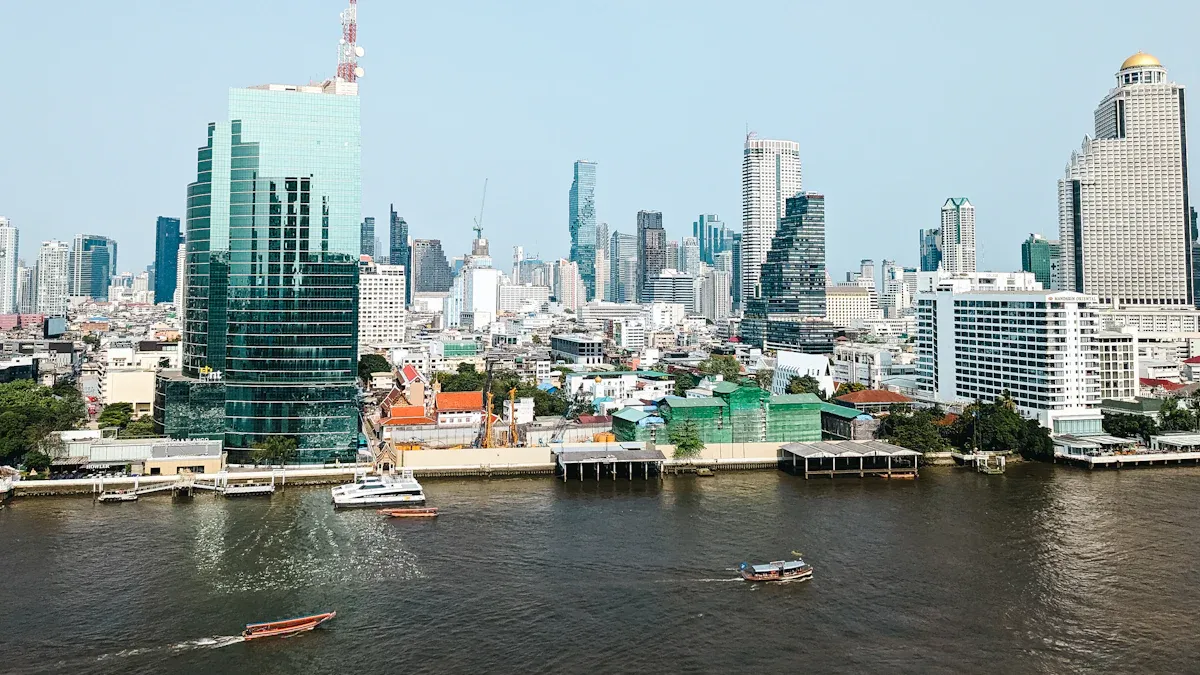- EasyCard
- Trade
- Help
- Announcement
- Academy
- SWIFT Code
- Iban Number
- Referral
- Customer Service
- Blog
- Creator
Is Buying Property in Thailand More Cost-Effective Than in Taiwan? A 2025 Price Comparison

Image Source: pexels
In 2025, the gap in property prices between Thailand and Taiwan is striking. Taking Bangkok and Taipei as examples, Bangkok’s property prices are roughly one-third of Taipei’s. However, the investment returns are significantly higher. The annual rental yield in Bangkok is approximately 5% to 6%, compared to about 2% in Taipei. This means that investing in Thai real estate offers you higher potential returns.
Beyond investment returns, Thailand’s advantage in property prices also translates into lower living costs. For those seeking to reduce living expenses or increase asset returns, Thailand offers an attractive option. Whether for investment or residence, the Thai real estate market may better suit your needs.
Key Points
- Thailand’s property prices are roughly one-third of Taiwan’s, allowing investors to enter the market at a lower cost.
- Rental yields in Bangkok average 5% to 6%, significantly outperforming Taipei’s 2%, offering better investment returns.
- Thailand’s living costs are lower than Taiwan’s, enabling easier financial management and more funds to be allocated toward investment.
- Foreigners can easily purchase condominiums in Thailand, with simple legal procedures ensuring investment security.
- Using BiyaPay for international remittances provides low fees and fast transactions, guaranteeing safe fund transfers.
Overall Comparison of Property Prices in Thailand and Taiwan

Image Source: pexels
Average Property Price Differences in 2025
In 2025, property price disparities between Thailand and Taiwan remain significant. Market data shows Taipei’s average price is about NT$1,000,000 per ping (3.3 square meters), while Bangkok’s average price is only about NT$200,000 per ping. This means purchasing a 30-ping condo in Taipei costs about NT$30 million, whereas the same size property in Bangkok costs roughly NT$6 million. This price gap makes buying property in Thailand a top choice for many investors.
Furthermore, Thailand’s property price growth is relatively stable, with an average annual increase of 3% to 5%. In contrast, Taiwan’s housing price growth is faster but accompanied by higher market risk, making Thailand’s market more attractive for those seeking steady investment.
Regional Price Differences (Bangkok vs. Taipei)
Comparing Bangkok and Taipei reveals not only total price differences but also regional value variations. Key data include:
- Bangkok city center: Average price approximately NT$250,000 per ping, suited for high-end investors.
- Bangkok suburbs: Average price around NT$150,000 per ping, suitable for budget-conscious buyers.
- Taipei city center: Average price about NT$1,200,000 per ping, expensive but with prime locations.
- New Taipei suburban areas: Average price about NT$500,000 per ping, offering better cost-performance ratios.
These figures indicate that whether in the city center or suburbs, Thailand’s property prices are significantly lower than Taiwan’s. For those wanting to enter the real estate market at a lower cost, Bangkok’s suburbs may be ideal.
Price Comparison by Property Type (Condominium vs. Detached Houses)
Property price structures differ notably between Thailand and Taiwan. Some examples:
- Taipei city center:
- Total price NT$20 million, annual rental income NT$600,000, price-to-rent ratio of 33.3, indicating high prices.
- New Taipei suburbs:
- Total price NT$8 million, annual rental income NT$300,000, price-to-rent ratio of 26.7, considered reasonable.
- Taichung city:
- Total price NT$15 million, annual rental income NT$500,000, price-to-rent ratio of 30, near the upper reasonable limit.
By contrast, Thai condominium prices are more attractive. For example, a luxury condo in central Bangkok costs about NT$5 million, with annual rent up to NT$250,000, yielding a price-to-rent ratio of only 20. This cost-effectiveness makes buying property in Thailand a wise choice.
Tip: The price-to-rent ratio formula is: Price-to-Rent Ratio = Total Property Price ÷ Annual Rental Income.
This formula helps quickly assess investment value of a property.
If you prefer detached houses, Taiwan offers more options but at higher prices. Thailand’s detached houses mainly cluster in suburbs, costing roughly NT$8 million to NT$10 million, suitable for buyers seeking more private space.
Advantages of Buying Property in Thailand

Image Source: pexels
Cost Performance of Thai Property Prices
Thailand’s property cost-performance ratio is impressive. In Bangkok, high-end condos in the city center are priced at about NT$5 million yet offer modern facilities and convenient transport. Compared with Taipei city center’s prices often exceeding NT$20 million, the Thai market lets you enjoy high quality living at a lower cost.
Moreover, Bangkok’s price-to-rent ratio is about 20, much lower than Taipei’s 33. This means investing in Thai real estate offers faster capital recovery and steady returns. Whether investing or living, Thailand’s property prices provide excellent value.
Investment Returns and Rental Yields
Thai real estate investment yields rank among the best in Asia. Areas like Thonglor and Rama 4 in Bangkok show stable rental yields between 5% and 6%. For vacation properties, Phuket and Koh Samui offer even higher rental returns, reaching 8% to 10%.
These figures indicate that Thailand’s real estate market not only features low prices but also provides strong rental income. Buying property in Thailand means lower cost with stable cash flow, adding security to your finances.
Living Costs and Tax Benefits
Living expenses in Thailand are much lower than in Taiwan. Daily costs such as food, transport, and entertainment are often half or less of Taiwan’s, allowing easier financial management and more funds for property investment.
Tax-wise, Thailand offers friendly policies to foreigners. Taxes during property purchase are relatively simple and low, reducing your transaction costs. These benefits lower barriers and enhance overall investment returns. Choosing Thailand for property means enjoying lower living and tax burdens, making investment more appealing.
Ease of Foreign Ownership
Thailand’s foreign ownership policies are very accommodating, making market entry easy. By law, foreigners can legally own condominium units as long as the foreign ownership ratio in the building does not exceed 49%. This means you can directly buy condos with full ownership without complex legal procedures.
The buying process is straightforward. Providing your passport, proof of funds, and remittance records is sufficient to complete transactions. Local real estate agents typically offer full services, including property selection, legal documentation, and developer negotiations. These conveniences speed up purchases and help you settle in.
Additionally, the Thai government offers robust legal protection for foreign buyers. Transparency in contracts and secure property registration ensure your investment safety. Choosing Thailand allows you to invest with confidence and enjoy a low-cost property market backed by legal assurance.
Convenience in Remittance and Fund Transfers (Introducing BiyaPay)
Cross-border fund transfers are critical in overseas property purchase. Thailand’s banking supports various international remittance methods, enabling easy fund transfers from Taiwan. However, traditional methods often incur high fees and exchange rate risks affecting your purchase cost.
To address this, BiyaPay offers an efficient, secure cross-border remittance solution. Using BiyaPay, you benefit from:
- Low fees: BiyaPay’s remittance fees are far lower than traditional banks, saving costs.
- Real-time rate updates: The platform provides live exchange rates letting you remit funds at optimal times, reducing currency risk.
- Fast transfers: BiyaPay completes transactions usually within 24 hours, ensuring no delays in your buying process.
- Strong security: Advanced encryption protects your funds and personal data, providing peace of mind.
If you plan to buy property in Thailand, choosing BiyaPay for remittance simplifies fund transfers, making deposits and payments smooth. BiyaPay offers reliable support to help your purchase succeed.
Tip: Before remitting, monitor local exchange trends and choose optimal methods to maximize fund value.
Advantages and Challenges of Buying Property in Taiwan
Stability and Capital Preservation in Taiwan’s Real Estate
Taiwan’s real estate market is known for its stability—appealing for those seeking capital preservation. Key factors supporting this include:
- GDP Growth: Steady economic growth supports housing prices.
- Population mobility: Major cities like Taipei attract high inflows, boosting housing demand.
- Rental yields: Stable rental income indicates a healthy property market.
Taiwan’s market has weathered economic cycles while maintaining steady price appreciation—offering strong risk resistance and confidence to investors.
Tip: Monitoring housing inventory and new supply levels helps gauge future price trends.
High Entry Barriers and Loan Burdens in Taiwan
Buying property in Taiwan presents challenges, especially for first-time buyers:
- Average mortgage amounts hit a 15-year high at NT$10.43 million.
- Average mortgage interest rate is 2.23%, increasing monthly repayment pressure.
- Taipei’s average mortgage amount in Q3 reached NT$18.32 million, heavy burden for middle class.
Additionally, government loan restrictions raise barriers by lowering loan-to-value ratios, requiring higher down payments. This can delay first-time buyers’ ability to purchase.
Note: Before buying, carefully assess finances and loan terms to avoid excessive debt.
Trends and Challenges in Taiwan’s Housing Prices
Taiwan’s housing prices continue to rise in 2025 but face challenges. Data shows overheated price growth in certain areas, with market corrections underway. Stock market volatility and shrinking transaction volumes add uncertainty.
Big data analysis (KEYPO) highlights hot keywords like “high housing prices,” “loan pressure,” and “market consolidation,” signaling a potential adjustment phase despite ongoing price increases.
If buying in Taiwan, focus on areas with long-term appreciation potential, such as well-connected districts with stable population inflows, to maintain asset value through volatility.
Advice: Keep abreast of market trends and consult experts to develop wise purchase strategies.
Choosing Your Location Based on Needs
Considerations for Investment Properties
If purchasing for investment, focus on metrics like capital growth, cash flow, and market risk. The following table summarizes core concerns:
| Indicator | Investment Focus |
|---|---|
| Capital Growth | Annual price appreciation; location development key. |
| Loan-to-Value | Leverage and cash flow management for stability. |
| Vacancy Rate | Low vacancy indicates strong rental demand. |
| Cash Flow | Net rental income after expenses; key profit metric. |
For example, Taoyuan’s real estate market provides detailed ROI and risk data, covering rental yield, holding costs, and appreciation potential. These insights help identify high-return, manageable-risk areas, securing your investment.
Tip: Choose stable-population, infrastructure-rich regions with higher growth potential for investment.
Choosing for Owner-Occupation
If buying to live, prioritize convenience, price stability, and comfort:
- Convenience: Areas with good transport, quality schools, and commercial facilities improve daily life.
- Price Stability: Avoid speculative neighborhoods; essential-demand areas suit owner-occupiers.
- Loan Burden: Ensure monthly repayments are affordable to maintain quality of life.
Areas with essential demand have stable living functions and jobs, like Neihu District in Taipei or Banqiao in New Taipei. Though pricier, these areas offer stability and long-term suitability.
Advice: Inspect neighborhoods personally to confirm suitability.
Lifestyle and Cultural Differences
Lifestyle and culture also affect location choice. Thailand and Taiwan differ significantly:
- Thailand: Slower pace, suitable for those who prefer a relaxed lifestyle. The multicultural environment helps foreigners integrate quickly.
- Taiwan: Highly convenient, suited for efficiency seekers. Family-oriented culture is especially friendly to households with children.
If you favor tropical climate and international vibes, Thailand may suit you better. If you value stable society and convenient public services, Taiwan is preferable.
Reminder: Align home choice with your lifestyle and cultural preferences to find a truly comfortable home.
The price gap between Thailand and Taiwan is clear: Thailand offers low prices and high yields, ideal for high-return seekers; Taiwan offers market stability, better for preservation-minded buyers. Choose your property location based on your finances and needs wisely.
For Thailand property purchases, cross-border remittance is inevitable. Using BiyaPay provides low fees, real-time rates, and fast transfers, ensuring secure and efficient fund movement. Choose BiyaPay to simplify your buying journey!
Reminder: Whether investing or living, choosing the right location and tools maximizes your asset value.
FAQ
1. What legal regulations should be noted when buying property in Thailand?
Thai law allows foreigners to own condominiums, provided foreign ownership in the building doesn’t exceed 49%. You must provide passport, proof of funds, and remittance records during purchase.
Tip: Seek professional real estate legal assistance to ensure a safe, lawful transaction.
2. How to manage property after purchase in Thailand?
You can hire professional property management companies to handle leasing, maintenance, and daily operations, freeing you from direct management.
Benefit: Management companies save time and help preserve property value.
3. Is remittance to Thailand safe?
Using cross-border remittance platforms like BiyaPay ensures safe, efficient fund transfers with low fees and real-time exchange rates.
- Advantages:
- Cost-saving
- Secure transactions
- Faster remittance
4. Is the Thai real estate market stable?
Thailand’s market is stable, especially in hotspots like Bangkok and Phuket. Annual price growth ranges 3%-5%, rental yields 5%-6%.
Advice: Research local market trends and choose high-potential locations before investing.
5. Is buying property in Taiwan more cost-effective than Thailand?
Taiwan offers market stability but high prices and loan pressure. Thailand provides lower prices and higher yields, suitable for those seeking higher returns.
Conclusion: Choose the location best matching your needs and finances.
*This article is provided for general information purposes and does not constitute legal, tax or other professional advice from BiyaPay or its subsidiaries and its affiliates, and it is not intended as a substitute for obtaining advice from a financial advisor or any other professional.
We make no representations, warranties or warranties, express or implied, as to the accuracy, completeness or timeliness of the contents of this publication.




Contact Us
Company and Team
BiyaPay Products
Customer Services
is a broker-dealer registered with the U.S. Securities and Exchange Commission (SEC) (No.: 802-127417), member of the Financial Industry Regulatory Authority (FINRA) (CRD: 325027), member of the Securities Investor Protection Corporation (SIPC), and regulated by FINRA and SEC.
registered with the US Financial Crimes Enforcement Network (FinCEN), as a Money Services Business (MSB), registration number: 31000218637349, and regulated by FinCEN.
registered as Financial Service Provider (FSP number: FSP1007221) in New Zealand, and is a member of the Financial Dispute Resolution Scheme, a New Zealand independent dispute resolution service provider.



















